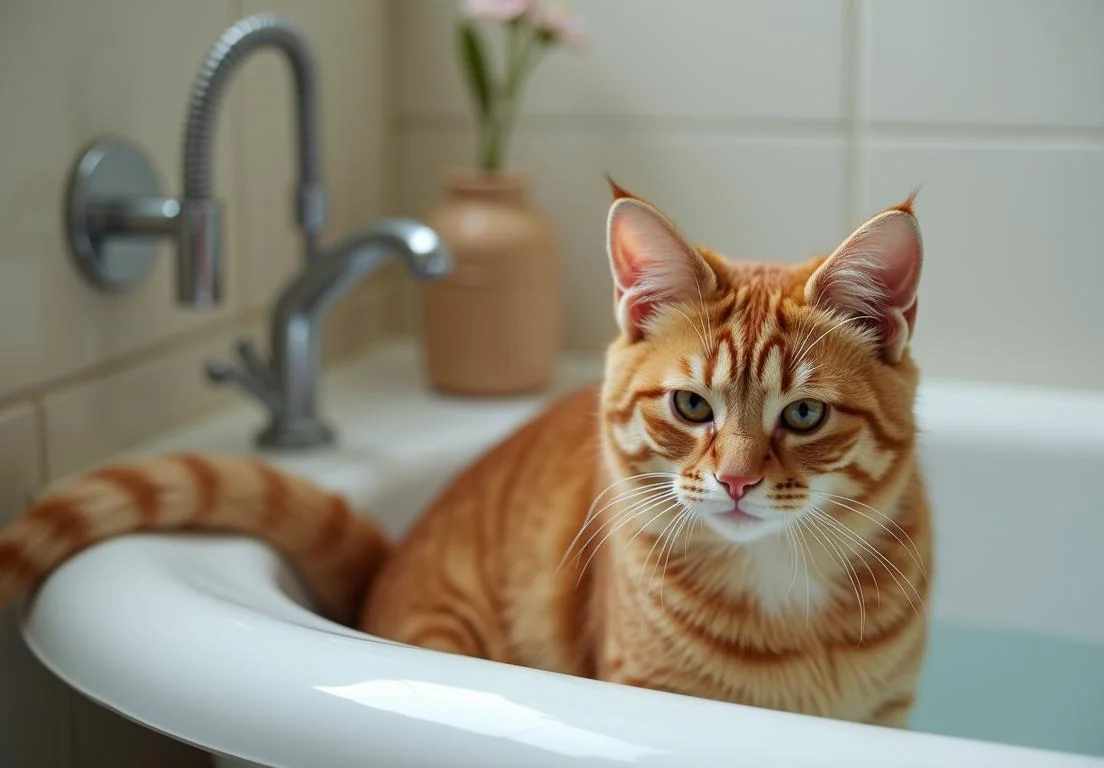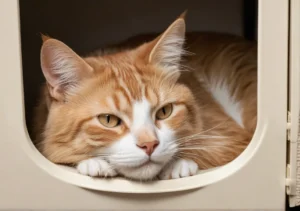Has your cat taken a sudden interest in the bathtub? You’re not alone in wondering about this peculiar behavior. Many cat owners have faced the baffling situation of finding their feline friends relieving themselves in the most unexpected spots.
There are several reasons why your cat might choose the bathtub as their restroom. It could range from a preference for cool surfaces, to issues related to stress, health, or problems with their litter box. But there’s so much more to this curious behavior that could reveal important insights into your cat’s well-being. Keep reading to discover the many aspects behind this unconventional choice!

Reasons for bathroom preference
Cats are creatures of habit, and their choices often leave us scratching our heads. If your feline decides the bathtub is a more appealing spot than the litter box, several factors could be at play.
Comfort and safety are paramount for cats. The smooth, cool surface of a bathtub might feel soothing, especially during warmer months. Plus, it’s a contained space where they might feel less exposed to perceived threats.
Scent and cleanliness also come into play. If the litter box isn’t kept up to snuff or the litter is too fragrant, your cat may be looking for a cleaner alternative. Cats are notoriously finicky about smells, so switching to a fresher litter could entice them back.
Sometimes, it’s a curiosity thing. Cats are natural explorers, and the bathtub can be an intriguing new bathroom. If they see you using it, they might decide it’s a more interesting option.
Environmental factors, like noise or disturbance in their usual bathroom spot, can also drive them to seek solitude in the tub. If life around their litter box is hectic, find a quieter, more relaxed spot for their potty needs.
Health issues to consider
Shifts in bathroom habits can sometimes point to underlying health concerns. If your cat’s pooping in the bathtub is a new behavior, it’s worth keeping an eye on their overall health status.
Conditions like urinary tract infections (UTIs) or gastrointestinal issues can lead to altered bathroom behaviors. For instance, if your cat is experiencing pain during urination or defecation, they may associate the litter box with discomfort and opt for the bathtub instead. Additionally, diabetes or hyperthyroidism can cause frequent urination, leading a cat to seek alternative locations that require less effort.
If you notice changes such as straining, blood in stool, or excessive grooming around their hindquarters, it’s time to reach out to your vet. Early intervention is crucial for any health issue, especially for conditions like colitis or inflammatory bowel disease.
The key here is observation. Keep an eye on hydration, eating habits, and general behavior. Any substantial shifts should prompt a visit to the vet for a thorough check-up; it’s better to be safe than sorry when it comes to your furry friend’s health.
Litter box problems
Cats can be picky about their bathroom habits, and a dirty or poorly placed litter box is often the culprit. If your cat’s taken a detour to the bathtub, it might be due to cleanliness issues. Cats naturally gravitate toward clean spaces; if the litter box isn’t scooped regularly or the litter is clumping and dirty, they may opt for a more appealing spot.
Also, consider litter type. Some cats prefer fine, unscented litter, while others might like a specific texture. Experimenting with different options can make a world of difference. Box location matters too. If the litter box is too close to noisy appliances or in an area with high foot traffic, your cat might avoid it altogether. Aim for a quiet, accessible spot, away from their food and water bowls.
Another vital aspect is the number of litter boxes. Ideally, you should have one box per cat, plus an additional one. If your home’s getting a bit crowded, your kitty may feel pressure and might bypass the box entirely in favor of the bathtub.
Environmental stressors
Stress can seriously impact your cat’s behavior, sometimes causing unexpected bathroom habits. Think about any recent changes in your home. A new pet, moving furniture, or even changes in your daily routine can create an unsettling atmosphere for your feline friend.
Heightened noise levels can also stress out cats. If you’ve had more commotion in your home, consider if that could deter your cat from their usual bathroom spot. Cats prefer their peace and quiet, and if it’s disrupted, they’ll look for a more comforting place, like the bathtub. Cats can be sensitive to things like fluctuating temperatures, too. If they’re too warm or cold, they might avoid the litter box out of discomfort.
If you’ve recently added anything new to the house—like houseplants or decorations—that may also contribute to their stress, especially if they’ve been in the habit of knocking things over or feeling confined. Sometimes, the bathtub just seems like a better option in such cases.
Taking some time to observe your cat’s behavior and the environment can help you pinpoint the source of their stress and give them the comfort they need.
As cats age, their behaviors can shift dramatically, including their bathroom habits. Senior cats may experience a range of health issues like arthritis, cognitive decline, or digestive problems, all of which could lead them to seek alternative places to relieve themselves. For example, if your senior cat has trouble jumping into the litter box due to joint pain, they might prefer the bathtub, which sits lower and could be less of a challenge. Additionally, some older cats may forget learned behaviors or become disoriented, making the bathtub seem like a more appealing option. Regular vet checkups can help you stay ahead of any potential issues, so keep an eye on changes in your cat’s behavior, as they can offer important clues about their health.
The allure of cool surfaces
Cats have a knack for gravitating toward cool, smooth surfaces, especially during the warmer months. A bathtub is basically a giant cat magnet in hot weather, offering a perfect spot to chill out. The temperature helps them stay comfortable, and the slick surface can feel nice against their fur. If your cat finds the litter box too stuffy or uncomfortable, they might opt for the hygienic appeal of the tub. This can be particularly true for cats with long fur, who might feel overheated in their usual potty spot. To encourage your cat to stick to the litter box, consider keeping it clean and placing it in a quiet, cool area. You might even try placing a cooling mat nearby to draw them back to the intended spot.
Behavioral quirks
Cats can choose quirky places for elimination, like the bathtub, based on a few specific behavioral tendencies. Stress or anxiety is a common culprit. If you’ve changed your routine, introduced new pets, or had noisy visitors, your cat might feel uneasy about using its usual litter box. Another aspect to consider is litter box aversion; sometimes, it’s as simple as your cat disliking the litter, the box’s cleanliness, or even its location.
Some cats are also exploratory by nature. If the bathtub is a fun, new space for them to play in, they might just see it as a prime spot to suitably relieve themselves. A preference for smooth surfaces can play a role too; the cool, clean feel of the bathtub might appeal more than rough gravel in a litter box.
Lastly, health issues can’t be ignored. Conditions like urinary tract infections can cause your cat to associate pain with the litter box, prompting them to seek out alternative places. If this behavior continues, it might be wise to consult a vet.
Interesting cat trivia
Did you know that cats are generally very particular about their bathroom habits? Most cats prefer to bury their waste, a behavior rooted in instinct to hide their scent from predators. Interestingly, the texture and smell of litter matter a lot. Cats have more sensitive noses than humans, so what smells pleasant to us can be a deterrent to them.
Here’s something else that’s quite fascinating: not all cats will be open to using the same litter box. Many experts suggest having one litter box per cat, plus one extra, especially in multi-cat households.
Also, timing plays a role in their habits. Cats tend to have routines and may prefer to do their business at specific times, often after meals or during the night. This behavior stems from their ancestral instincts, where they had to find safe times and spots to eliminate.
For those curious about the appeal of the bathtub: cats often gravitate toward places that seem more isolated or unique. A bathroom may offer a sense of safety, making it an attractive space for a cat in search of privacy.
Alex, a passionate animal lover, has experience in training and understanding animal behavior. As a proud pet parent to two dogs and three cats, he founded AnimalReport.net to share insights from animal experts and expand his knowledge of the animal kingdom.




